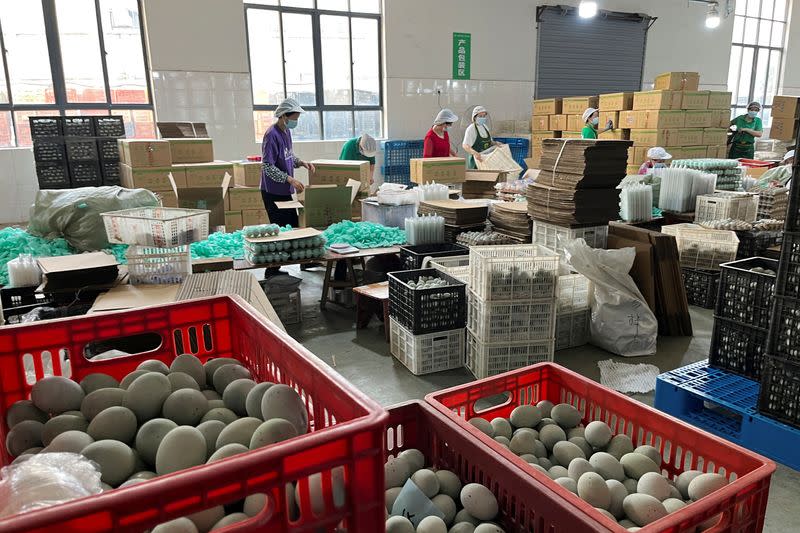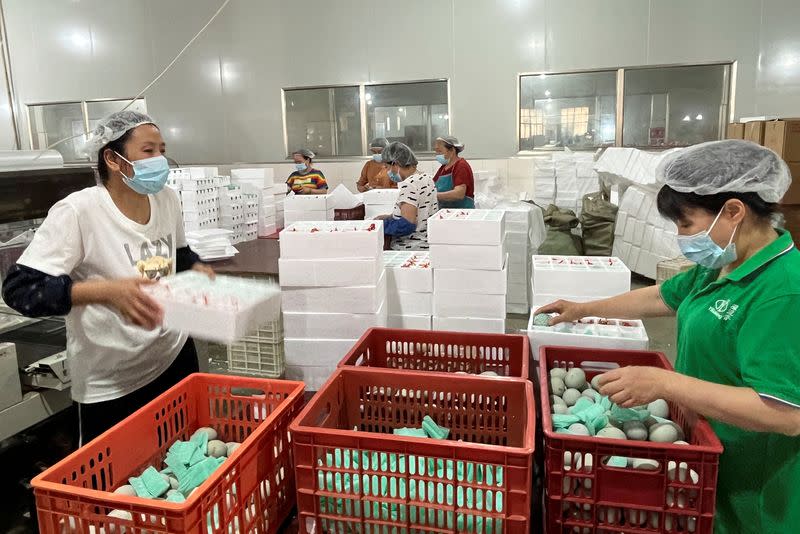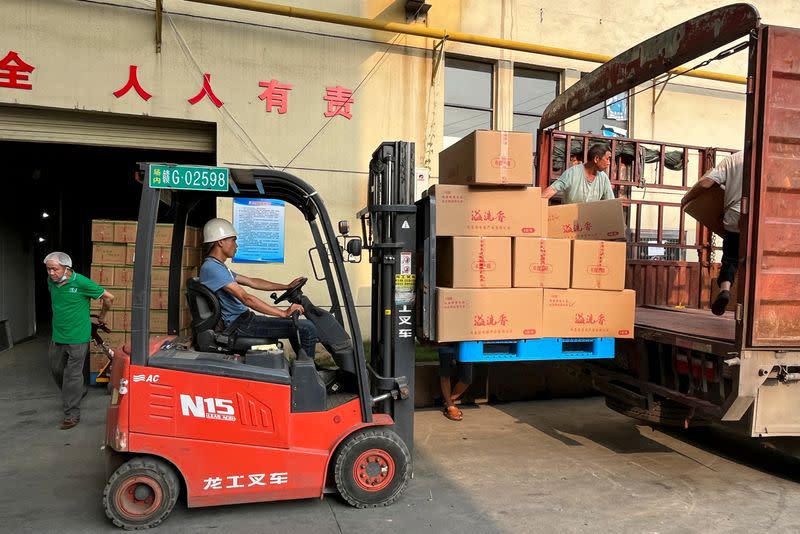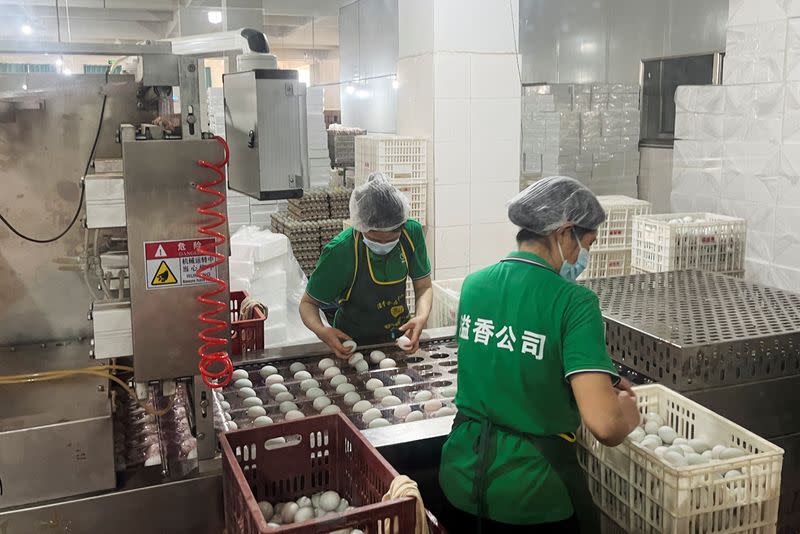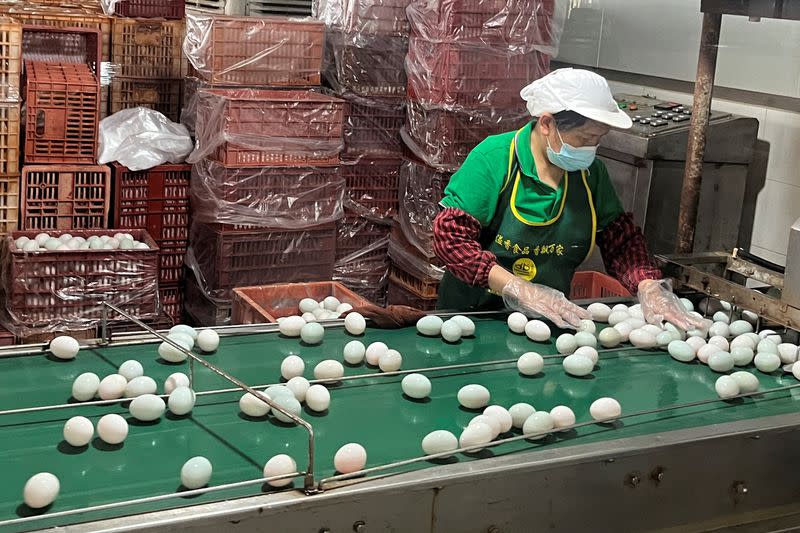By David Kirton
RUICHANG, China (Reuters) - When Steven Du took over his parents' factory producing temperature control systems in Shanghai, one of the first changes he made was to turn on the plant's heating in winter - something his frugal forebears were reluctant to do.
"If you don't improve their environment, the workers aren't as happy and it's harder for them to do their best work," the 29-year-old said. "The change is worth the extra cost."
Du, like tens of thousands of other young Chinese factory bosses, is inheriting a basic manufacturing business that can no longer rely on the labour-intensive model that made China the world's largest exporter of goods.
A shrinking and ageing workforce and competition from Southeast Asia, India and elsewhere are making at least a third of China's industrial base - the low-end manufacturers - obsolete, Chinese academics say.
This do-or-die mission of tech upgrades and practical changes largely falls on a group of people in their 20s and 30s known as "chang er dai", or "the second factory generation", a play on the derogative term for spoilt, rich children, "fu er dai".
"If I'm chang er dai, I'm trying to save my family business from bankruptcy," said Zhang Zhipeng, a research assistant at the Shenzhen Research Institute of High-Quality Development and New Structure, who estimates roughly 45,000 to 100,000 of this cohort are at various stages of taking over up to one-third of private Chinese manufacturing firms.
The large-scale generational transition, which comes as China's growth prospects dim, is the first in the country's private sector since the chang er dai's parents emerged as industrialists in the decades after Mao Zedong's death in 1976.
Reuters interviewed eight chang er dai for this report, who described their attempts to bring family businesses into the modern era with efficiency upgrades while facing challenges such as labour costs, shortages of workers and, in some cases, disagreements with relatives on the best way forward.
Du spoke on the condition that his business not be named to protect the privacy of his semi-retired parents, whom he said were in their 50s and largely leave factory affairs to him.
Like his peers, Du grew up with a level of comfort and opportunities his parents never dreamed of.
He went to high school and university in New Zealand, specialising in electrical engineering. He moved to the United States, working at Apple supplier Foxconn's Wisconsin facilities. He studied Taiwanese and Japanese production methods, focused on reducing inefficiencies.
Those skills would come in handy in a factory the Chinese state set up in 1951 and privatised in 2002.
His father's business acumen and his mother's hard work helped turn the factory into a supplier to large Chinese appliance firms. It also sells components used in temperature-control systems for shopping malls, computer rooms, battery cooling, and medical equipment.
But production processes remained largely unchanged until Du took over in 2019. He introduced specialised industrial software that cuts across accounting, orders, procurements, deliveries, and other processes previously handled by humans, Du said.
He remodelled the factory floor to allow forklifts to drive around easily, grouping storage and production units differently to minimise physical effort for a workforce whose average age is around 50. A worker now walks 300 metres to complete the more complex tasks, down from one kilometre, and needs less than a third of the time to do it.
While his mother spent long hours micromanaging production, Du ends most days around 4 p.m. in a gym he set up inside the factory, and allows workers to use, before driving home.
"Young people like to be lazier, but laziness is actually a manifestation of progress," he said.
Du raised wages by 10-20% in the past three years, to keep staff turnover under 5%, but says his factory is 50% more efficient.
"Factories need to transition to higher-end manufacturing or are doomed to fail, because their costs are rising," said Zhang, the researcher.
A 'MOTHER'S SON'
Zhang Zeqing estimates he achieved a similar efficiency boost by digitalising processes since he began co-managing with his parents their egg-products factory in Ruichang, a southeastern city.
At Ruichang City Yixiang Agricultural Products, workers in green uniforms place duck eggs into cups attached to a conveyor belt that feeds a vacuum-packing machine. A new screen above the machine displays the speed at which the eggs are sealed and estimates average output per worker, as well as the time and manpower needed to pack 10,000 eggs.
Barcodes track all products from farm to factory to store, allowing supervisors to monitor orders, production and delivery on their phones and make decisions based on real-time data.
"Before, we'd record all this by hand on paper," said the 30-year-old. "All of the internal data was muddled. It led to a lot of wastage."
Like five of the other chang er dai who spoke to Reuters, Zhang never planned to take over the factory. He wanted to study landscape design in France.
But he felt he had to step in, at least for a few years, and convince his now 55-year-old parents that tech upgrades, and setting up new distribution channels on e-commerce platforms, were worth investing in.
Something had to be done, he thought, as "the frontline employees are getting older and young people are less willing to work on the frontline". China has record rates of jobless youth but many of them have university degrees and prefer not to work in factories, even if they take a job below their education level.
Zhang's parents resisted at first, unwilling to spend money on a business they thought was doing fine. But they relented, eventually.
Sales have risen 35% annually since he came on board.
"I sometimes wonder why our e-commerce was successful when others failed. A manager at a company told me that because you are your mother's son, she will support you infinitely, that is, even if you fail," Zhang said.
'TOO CHALLENGING'
To be sure, China as a whole is upgrading its industrial complex in more significant ways than the changes implemented by young factory managers like Du and Zhang.
Some segments, such as the heavily robotised electric vehicle industry, are disrupting global markets thanks to state subsidies, as well as foreign capital and know-how.
Chang er dai, however, help lift the bottom, which is also important for preserving China's share of world manufacturing, two industry experts told Reuters.
Some of the technology Zhang introduced came from Black Lake Technologies, a company founded by Zhou Yuxiang, who counts more than 1,000 chang er dai among his clients.
"For the past decades, the model of many Chinese factories was based on revenue growth, so very few of them paid attention to production efficiency or digitalisation," said the 34-year-old, who also sees himself as chang er dai, though he is not managing his parents' business.
"They manage their operations typically through stacks of paper. More advanced factories might use Excel, but that's it."
Tian Weihua, an academic specialising in manufacturing upgrades at the Science and Technology Innovation Research Institute, a government think-tank, says the tech savvy and foreign experience of chang er dai give them a better chance than their parents to keep businesses competitive in a new environment of higher costs, weaker external demand and emerging manufacturing centres in cheaper, less developed countries.
But "technological upgrading doesn't cure all ills", said Tian, adding that further steps will be needed, including on product innovation.
Not all chang er dai will get there.
After studying textile design at the University of Arts in London, Zhang Ying, 29, took over her family's garment factory in the eastern city of Ningbo in 2017.
But the business was struggling. Wages had more than doubled within a decade, to over 7,000 yuan a month. Workers, mostly migrants from inland provinces, were in short supply. She wouldn't dare fire them.
Last year, she took time off to have a child and left other managers in charge. She has no intention to return.
"It was too challenging: the pressure was too sudden and great. I was getting hives from the stress and needed to be on medication for a year, so I quit," she said.
(Reporting by David Kirton; Editing by Marius Zaharia and David Crawshaw)

